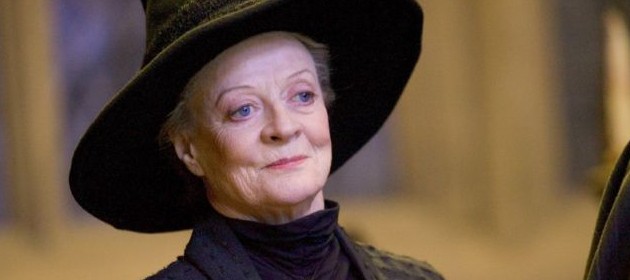How Wizards Do Money: Minerva McGonagall

Minerva keeps neat ledgers; a tap of her wand against the page and the numbers fly from one column to another, ordering themselves like birds on wires. She keeps sugar and flour in labeled tins, clothes folded and arranged by color, though at her age there is scarcely any color to speak of. A touch of the Gryffindor scarlet-and-gold always somewhere on her person, but mostly black. Black is easy to care for, until it starts to fade. Then you have to repurpose it into something else; a sack, the dark pattern on a rag rug, maybe just a rag.
Minerva has repurposed herself, in her life, many times over. Her students now only see her as Headmistress; they don’t realize she’s survived two wars, although they’re all very aware of the war that ended right before they were born. They don’t know she was married, once, and widowed. They imagine she walked straight into Hogwarts as a first-year student and never left. A young girl who grew up, became old, and slowly faded, like her clothes.
What they don’t realize is that Minerva always chose. She had been born to parents ready to raise her as a Muggle, her mother having long-ago decided to give up witchcraft, but Minerva chose magic. When the Sorting Hat rested on her dark hair, it whispered in her ear that she was smart enough for Ravenclaw but brave enough for Gryffindor, and Minerva picked brave because she did not feel brave herself, not in that moment, and wanted to wrap it around her like a scarlet-and-gold scarf. She chose her life and she chose her lovers and she chose her husband, and as she grew older everybody forgot all of that, her new students assuming she’d never ridden in a plane or been to the movies or seen a computer.
She was with her father every day in the hospital, the summer that he died. There were computers and screens and phones and pop music and bags of crisps all over. Her students think she’s never seen a television programme. They watched so many together in that room, her hand on her father’s arm, the clock moving them closer to what they both knew was coming.
Minerva does not care to think about what it will be like when her own turn approaches. She has enough money to last until then, a combination of thrift and planning for her pension and learning how to live comfortably on very little. Now excess makes her slightly uncomfortable, as if she were in a stifling room. She knows how many meals each sack of beans will make. She knows that it tastes better if you only add a little bit of bacon.
She will be retired, at the end of this year. The bits of bacon will slowly become smaller and her black robes will slowly lose their shade. And then, she will lose hers. She’s got her records all tidied up and ready to fly directly to her solicitor; she’ll be buried next to her husband — she can already imagine half the people she knows saying “who?” — and her surviving assets will be liquidated and divided in three equal parts: one each to her two surviving nephews, and the third to Hogwarts.
She’s still half Muggle. She could find herself in her own hospital bed watching Downton Abbey as one of her nephews sits awkwardly next to her, happy to be there but also wishing he could go.
Or it could be St. Mungo’s. It’ll be a choice she’ll have to make eventually, if all goes well. It is the unwanted and best possible scenario.
But that is not a choice Minerva needs to make today. Today, she will finish her ledger, put on her scarlet-and-gold scarf, and pay a call on Sybill Trelawney. Then she will have tea with the new head of Gryffindor House, watch Quidditch practice, and be home in time for supper.
It will be a good day. A beautiful, bright day, with all the colors exactly where they should be.
Previously: Susan Bones
Support The Billfold
The Billfold continues to exist thanks to support from our readers. Help us continue to do our work by making a monthly pledge on Patreon or a one-time-only contribution through PayPal.
Comments